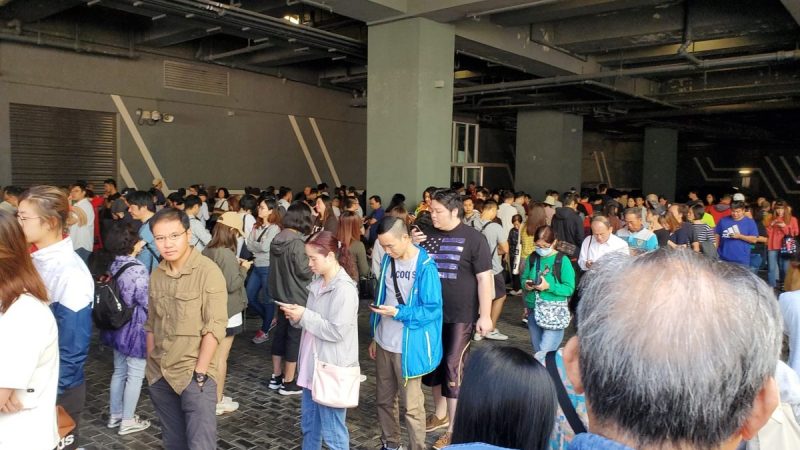
Voters queue outside a polling station. Photo from GV's content partner: the Stand News (dismantled in 2022).
The original version of these reports were written by Peter Lee and Hilary Leung and published in Hong Kong Free Press (HKFP) on May 2, 2023. The following edited version is published on Global Voices under a content partnership agreement with HKFP.
The number of District Council seats democratically chosen by the public in Hong Kong is to be slashed to around 20 percent, Chief Executive John Lee announced on May 2. Pending legislative approval, candidates will also face national security background checks and face a new nomination system following a landslide victory by the pro-democracy camp in the last polls in 2019.
According to the government’s proposed changes, only 88 seats scheduled for November will be directly elected by the public — down from 452 in the last election. The number of overall seats will fall from 479 to 470.
The election constituency boundaries will also be redrawn, allowing two representatives to be elected in each constituency, while each voter may only vote for one candidate. The total number of constituencies will be reduced from 452 to 44.

District Council seat distribution in 2019 (left) and 2023 (right). Image from Hong Kong Free Press.
Aside from the 88 seats voted on by the public, 179 will be appointed by the chief executive — a system that was previously abolished in 2016. The 27 ex-officio seats will remain.
The new District Councils will be chaired by the District Officer, a government official. The system is similar to the arrangement in Hong Kong during the colonial era under British rule.
The rest of the 176 seats will be determined through elections within the District Fight Crime Committees, District Fire Safety Committees, and Area Committees of each district. All members of these committees are chosen by the government’s Home Affairs chief.
When the District Council was established in 1982, the number of elected representatives was 132 out of 490 seats. Political scientist Kenneth Chan hence commented that “the pathway towards democracy has ended for good”:
For those counting, this is setting HK back by 40 years (the first time district council were elected was 1982) https://t.co/nviMgPjl46
— Renaud Haccart (@RHaccart) May 2, 2023
The city's Chief Executive explained the logic behind the change in election rules, citing the 2019 protests and a goal to stay united with China:
The black riots and Hong Kong version of a colour revolution in 2019 were a warning for Hong Kong.[…] We must plug all the loopholes in the system to prevent the District Councils from again becoming a platform for [advocating] black riots, Hong Kong independence and mutual destruction. We must prevent those who opposed China and stirred up chaos in Hong Kong from hijacking, manipulating, and paralysing the District Councils.
Vetted candidates
In order to run for the upcoming poll, candidates must now secure at least three nominations from each of the three committees, on top of nominations from voters in their own constituencies.
Candidates will also have to undergo background checks to ensure only “patriots” can govern Hong Kong, a principle laid out by Beijing when they overhauled the city’s electoral system in 2021.
The proposal will be tabled at the Legislative Council. Ming Pao cited sources as saying that the government expected the legislative work to be completed before July in order for the election to be carried out in late November or early December.
The government’s move came after pro-democratic candidates secured a landslide victory in the last District Council election in 2019 when the city was gripped by large-scale, months-long protests and unrest.
However, the majority of them resigned in July 2021 following media reports that the government would require them to take oaths and repay their wages and subsidies if disqualified.
District Council monitoring
Though the Basic Law stipulates that the district councils are consultative bodies for the government or responsible for providing district administration services, Lee said the government planned to set up a mechanism to monitor councillors who “failed the public’s expectations.”
Secretary for Home and Youth Affairs Alice Mak said in the same press meeting that investigations could be launched at the request of a District Council’s chairperson — which would be an official under the proposed change — or a motion passed by the council. The council members in question could appeal to the chief secretary for administration if they disagreed with the probe’s outcome.
Mak added that the Home and Youth Affairs Bureau would also make a list of “negative behaviours” in its upcoming guidance on District Councillors’ conduct.
When a journalist asked Chief Executive Lee if the government thought the number of democratically-elected members would be higher than in colonial times, he said: “I do not agree that pure[ly] counting election votes means democracy.”
A step backwards
At a Labour Day rally on Monday, the pro-democracy League of Social Democrats chair Chan Po-ying said any cut in democratically-elected seats at the District Councils would “absolutely [be] a step backwards.[…] we wonder how citizens’ voices can be reflected.”
Lo Kin-hei, chair of the city’s largest pro-democracy party, explained how the change scraped the grassroots representation body's watchdog function:
The District Council should be a body to recommend the government [about] how to do better, to actually watch how the government performs in the district; [Now] it is the government watching the District Council [and] how they perform. So it’s the other way around.
Last week, ex-chief executive Leung Chun-Ying said it was not necessary for Hong Kong to hold elections to appoint district-level administrators, whilst pro-Beijing heavyweight Rita Fan said the previous pro-democracy landslide made her “very afraid” and added that publicly-elected seats must be slashed for the city’s “self-protection.”
Most opposition figures are now behind bars, have fled the city, or have quit politics.







